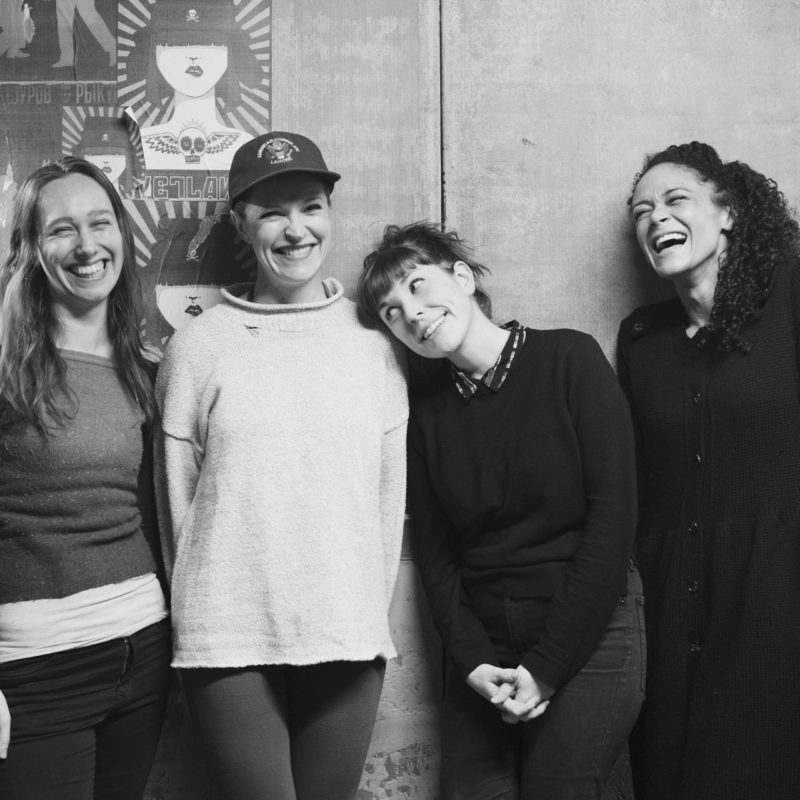Women of “The Great Comet of 1812”
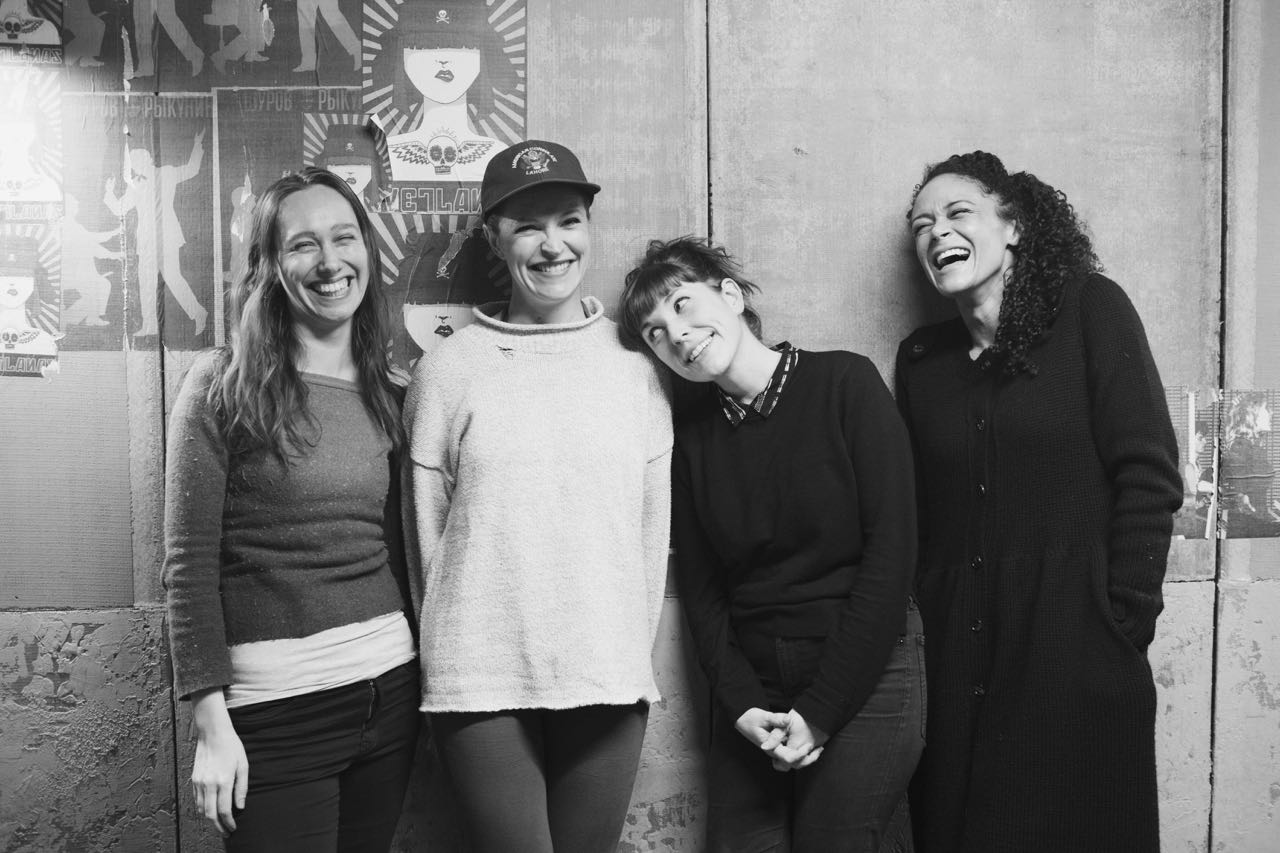
Written by Victoria Myers
Photography by Jacqueline Harriet
March 23rd, 2017
The Great Comet of 1812 by Dave Malloy and directed by Rachel Chavkin features an immersive set with audience members on stage and actors running through the audience; an eclectic score; a story loosely based on an excerpt from War and Peace; and the majority of actors in the cast making their Broadway debuts. Among those actors making their Broadway debuts are Brittain Ashford, Gelsey Bell, Amber Gray, and Grace McLean. The four of them come from performance backgrounds as diverse as the characters they’re playing. We recently sat down with them to discuss archetypes, the physicality of the show, balancing doing eight shows a week, and more.
At this particular moment in time, what do you each find most interesting about the character you’re playing?
Grace: If I know who the character loves, then I know what to do. It’s been fun and interesting to see the many different ways in which Marya loves people, and it changes. I love Natasha, we know that, but the way in which I love her kind of changes depending on other things that are going on for me. Sometimes it’s a motherly thing and sometimes it’s like a spurned lover. Sometimes it’s just like, “You stupid little shit face. Look at all this stuff I did for you, and you’re not appreciating me.” That’s kind of my way in, and I get to play with how love manifests itself.
Brittain: When I first started doing the show, I wasn’t really even thinking necessarily about my character that much. I found that throughout the various incarnations, I’ve really gotten to know the character a lot more, which makes the show so much more satisfying to perform. I feel it in the certain moments that are more obvious, like moments of distress, but I also feel it more in moments of silliness and joy. The first act, for my character, is very silly. It’s pretty much just having a good time, trying to calm Natasha. It’s been really nice to just get closer to that throughout the various incarnations.
Gelsey: For me, I think a lot about forgiveness throughout the show, and Mary’s different ways of handling forgiveness. Like things with my father, things with Natasha, even the small moment I have with Andrey at the very end of the show. I feel like that is a larger envelope that all the stories within the show live. But that’s something that I come back to on a daily basis, embodying her.
Amber: I agree with Brittain in that during the making of this thing, I very rarely actually thought of my own character. When we were creating this beast in a room, we spent the whole rehearsal process—composer, director, us—figuring out how to put up the play. We didn’t know it was going be on stage. Thinking about Hélène came so much later and I didn’t actually understand what Hélène was until I put on the costume the first time and stared in the mirror for a while. It was very outside in, in that respect. I have grown to love her more and more. All I had to do is make those exaggerated female shapes, where I break my body line—those total stereotypes of arms fanning, my weight’s on one leg and I could fall over at any moment, or swishing around. She is very girly in a way that I am straight up not. I’m pretty tomboyish, so it’s deeply satisfying to just fully, fully go there every night for two hours, and then be like, “That was fun, and I do not need to do that in my life at all.” I can bat my eyelashes on stage, and just be a total flirt in a way that I’m just not in life.
Going off of what both of you were saying about when you were putting the show together, how did you all find that affected your natural processes as actors?
Brittain: Speaking only for myself, I was so terrified at the idea of being in a stage production. I could really only focus on what was right in front of me.
Amber: That original version was very raw, in the sense that I think we had five musicians who were acting for the first time, and five actors who happened to be able to sing and were learning how to play instruments. So everybody had a skill in the room that they were very good at and trained in, and then a skill that they totally lacked. We really, desperately needed each other. We were very present and paid attention to each other, which sort of made the acting process quite natural. All acting exercises are about getting to being present, and we instinctively were, out of fear. It was very raw and very beautiful. I think that has maintained in the show, and grown, but that is the kernel that it began with.
Gelsey: I hadn’t really done acting. I had done a few things, but in most of them I could basically just be myself, as opposed to inhabiting another person. But I remember moments of being Mary and sitting down at the table with Natasha, and how I just was like, “All right, well, I’m really nervous because I don’t like strangers, and strangers are everywhere. So, Mary is also very nervous, and doesn’t like strangers.”
Grace: I came into the show after it was done at Ars Nova. It felt to me like there was already this structure in place and this way of relating to each other that I had to figure out how to fill. It felt like Marya was this big space and this big shape that I had to figure out where all the edges were and where the boundaries were. I remember after one of our first run-throughs, Rachel’s overarching note for me was: “Spikier. Marya is spikier.” Things like that feel kind of spacial to me, and like a thing that just needed to be filled, and I’d figure out how to fill it as we went along.
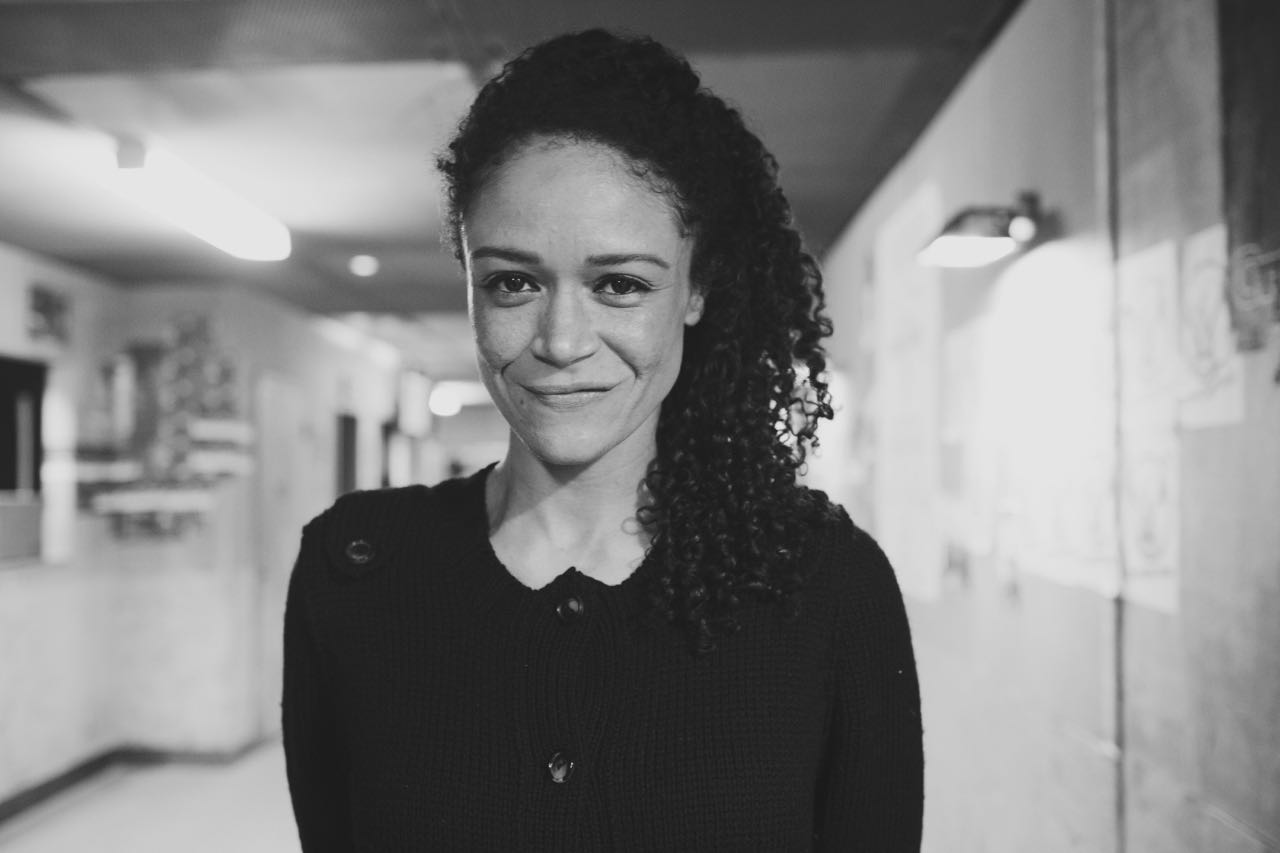
How has the quasi-period piece nature of the show affected your interpretations?
Brittain: Technically, yes, it’s 1812 and it’s a period piece, but it feels so like the emotions are very contemporary. We’re telling a story of love and redemption. In that aspect, story-wise, it doesn’t feel like a period piece. Also, it helps that there is this very modern contemporary music.
Amber: I’ve always found playing archetypes—and this show is full of archetypes—very freeing, because there is a right and a wrong way to play it. There is definitely a clear shape. I’m a circle. I can’t play it like a square. I find that very freeing. Once you know the clear shape, you can go as deep as you want, so that’s not to say they’re not three-dimensional. I find it very freeing when there’s a right and a wrong way. And I find it very freeing when people have such strong opinions of what the character is supposed to be because you’re never going to please everyone. So you may as well do whatever you want. A handful of people over the years have been like, “Hélène’s blonde.” And I’m like, “There also weren’t black people back in 19th century Russia.” I love saying that to them.
Gelsey: In terms of just my relationships to both Bolkonsky and also Andrey, I feel like there is something old fashioned about them. It’s because it’s a period piece that I can relate to those characters in such a submissive way. I almost feel like in this role I can understand the bind that women were in at that time.
How do you feel like the different elements of the physical production affect your performances?
Grace: It’s interesting. I really wish I could watch the show because I know there are 29 tracks that I’m missing and 29 moments in every moment that I’m missing. But that also means that you get to craft all of these little, little, little things. It’s always in motion and always in progress. To have people right next to you at all moments means you get to figure out how to relate to them. It can be as detailed as you want it to be. I really love that.
Amber: It keeps you in the present in a way that for a lot of shows you don’t have to be. But you have to be in this one. And in the listening. You don’t normally have to figure out your listening and your responses as much as the show makes you, which I love.
Brittain: I feel like it’s necessary to be present. We’re just there, and you’re so exposed. As Amber said, it keeps you very honest. You have to be present. I can’t slip off or else I am lost. That’s not good when you’re like, “Oh, crap. People are singing now.”
Are there ever any challenges with never really being able to get a full bird’s eye view of the show?
Gelsey: I watched a put-in and I learned a lot watching it, which definitely informed what I did later. Just because I saw the way the lights were working and the way the focus works. And obviously, it’s different for different seats. So I just watched one put-in from one angle. I also think there were a lot of things that Rachel said to me where once I watched the put-in I was like, “Oh, now I see why that was so important,” in a way that, when I was doing it, it was not so obvious to me.
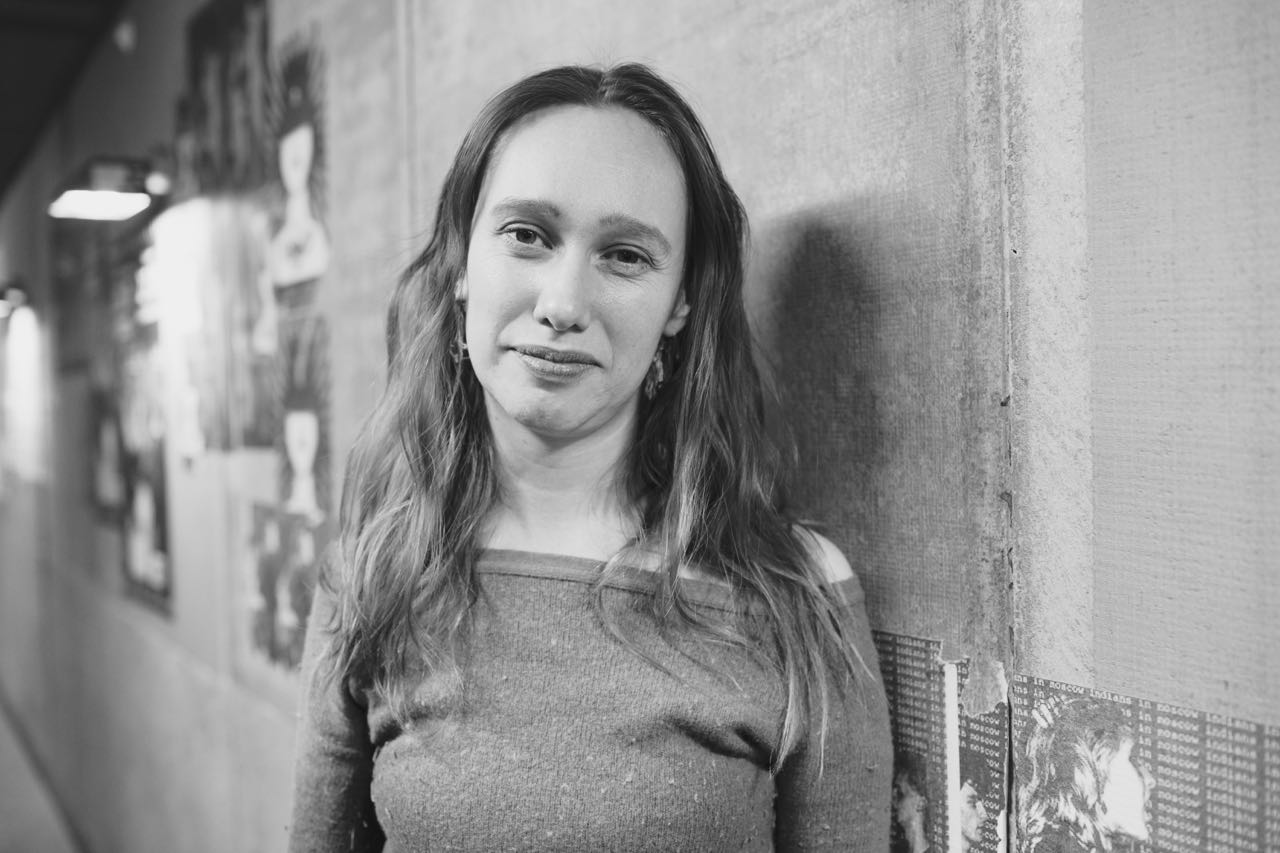
Let’s talk a little more about archetypes and how you used those in putting the show together.
Gelsey: We’re in a melodrama right? So everything’s heightened at all times. I think archetype is a great way to describe the way these characters function because they’re not really nuanced. I think we all fill them with nuances, but I think it’s pretty clear who they are and what they’re supposed to be. I find that really helpful.
Brittain: I have grown to really enjoy my character and what she is, not just in the shape of the story. Someone was like, “She saves the day!” I don’t know if that’s true. I had never thought about it as my character, that I’m saving the day. I’m just trying to save my friend. I identify or I sympathize with Sonya, and I really love that she’s there as this best friend presence that could be nothing, but she also gets this really tender, intimate, important moment in the show to talk about that friendship, which I think is just so nice and kind of refreshing.
Amber: All of our characters are pretty well loved. When audiences come, they love the female roles in this show in particular. I have found it interesting, since entering a new era in our country, people are a little more like, “The Kuragins are evil!” And they’re like, “Sonya is good. She is so good.” It’s really interesting. I’ve always loved both for different reasons. People are a little more wary of loving the evil ones lately. We’re not evil, we’re just going after what we want and not thinking about the consequences. The archetypes speak to different people more heavily depending on what’s going on in the world. And archetypes last throughout all eras. All of these characters will always be here through all the centuries.
Grace: Yeah, they just will resonate differently.
Brittain: I think, how rad is it that they are all in this story. It’s just refreshing. I just keep saying the word refreshing. Like an ice-cold beverage.
Beyond how the audience reacts, did any of your interpretations change since the election?
Grace: I think about different things at different moments sometimes, absolutely. It still is serving the story in the same way. It just helps me to grab my rage from a real place.
Brittain: It helps me at the end of the play when we have to stare at the comet and reflect on the world.
Gelsey: I feel like people react to old Bolkonsky in a more extreme way. In terms of like, “He’s a bad old man,” in a way that was not as true before.
Brittain: Before he was a silly old man.
Gelsey: Yeah, exactly. I feel like the meanness is grappled with maybe a little bit more now.
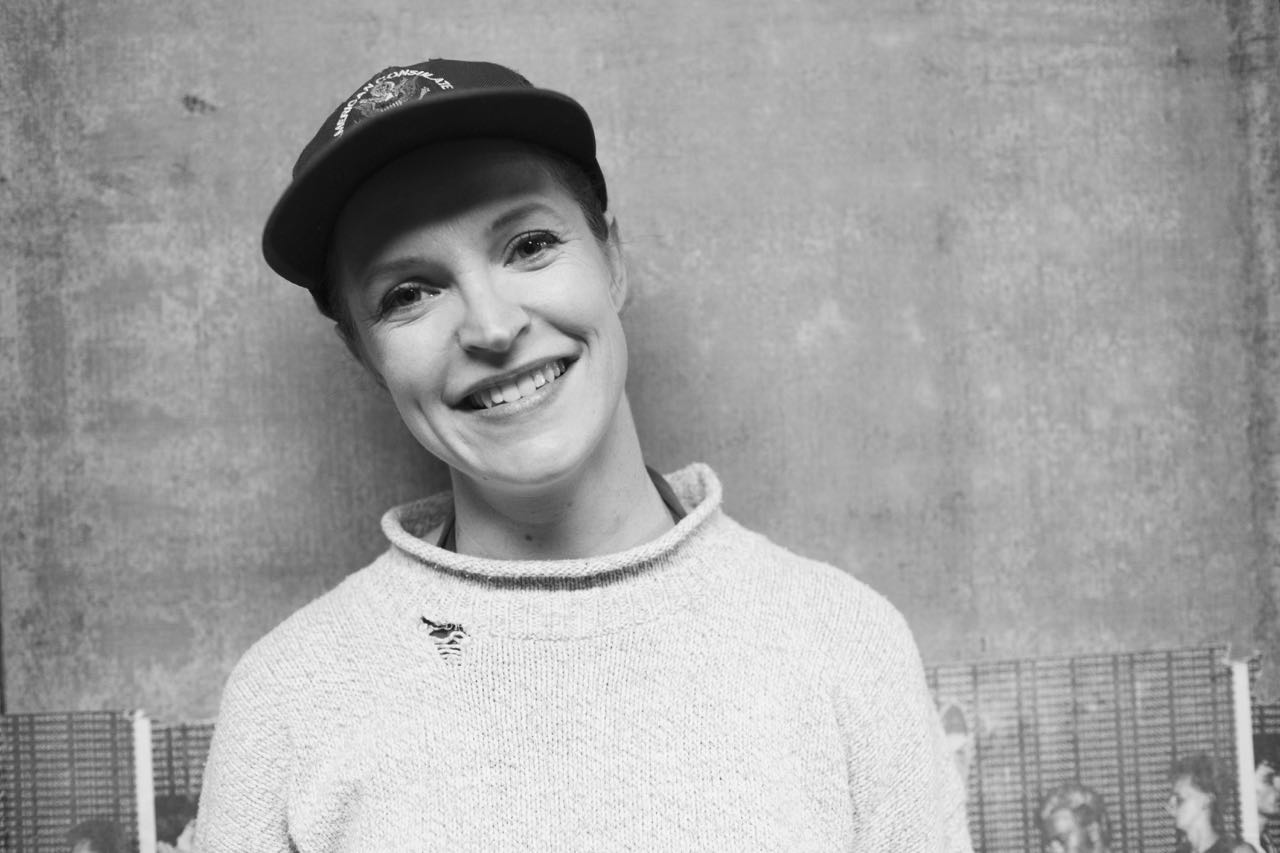
Are there any challenges with performing this style of the music in a Broadway house?
Amber: For sure. I think every version we’ve done, it physically has gotten bigger and bigger and bigger, which makes it more and more difficult to perform. You’re sustaining sound while going down all these crazy stairs and dancing. It’s hard. It always takes, for my body, a couple of months to figure out how to do it. You build stamina.
Brittain: When we first started doing the show, I don’t think that anyone ever was like, “Yeah! This is going to be the one that goes to Broadway.” I loved the show. I loved the music. I loved everyone involved in it. I love doing it. But there wasn’t really a part of me that was like, “I’m going to take this all the way to the top. It’s going to Broadway!” It’s been interesting to experience the audience reaction to the music. I had a friend who saw the show last night who absolutely loved it, and he was like, “What I loved about Dave Malloy’s writing is that you didn’t necessarily know what was going to come next. The melodies were not predictable. You didn’t know what the next note was going to be.” He loved that. But there are some people who don’t enjoy that. The music in this show I think is very different from almost anything else on Broadway right now.
Amber: Even song to song within the show, it’s so eclectic, which most people love but it bothers some people. They’re like, “Pick a style!” That’s not the point.
Gelsey: The musical composition is tied so much to the dramaturgy that when a different part of the story is being told, the music changes to illustrate that story better.
Amber: Physically, at the end of the day, it’s just straight up a very challenging show to do. Especially the female parts. All five female roles are very rangy. They are not easy to sing. And just physically, sans dancing, it’s crazy now. It straight up costs you something every time you do it.
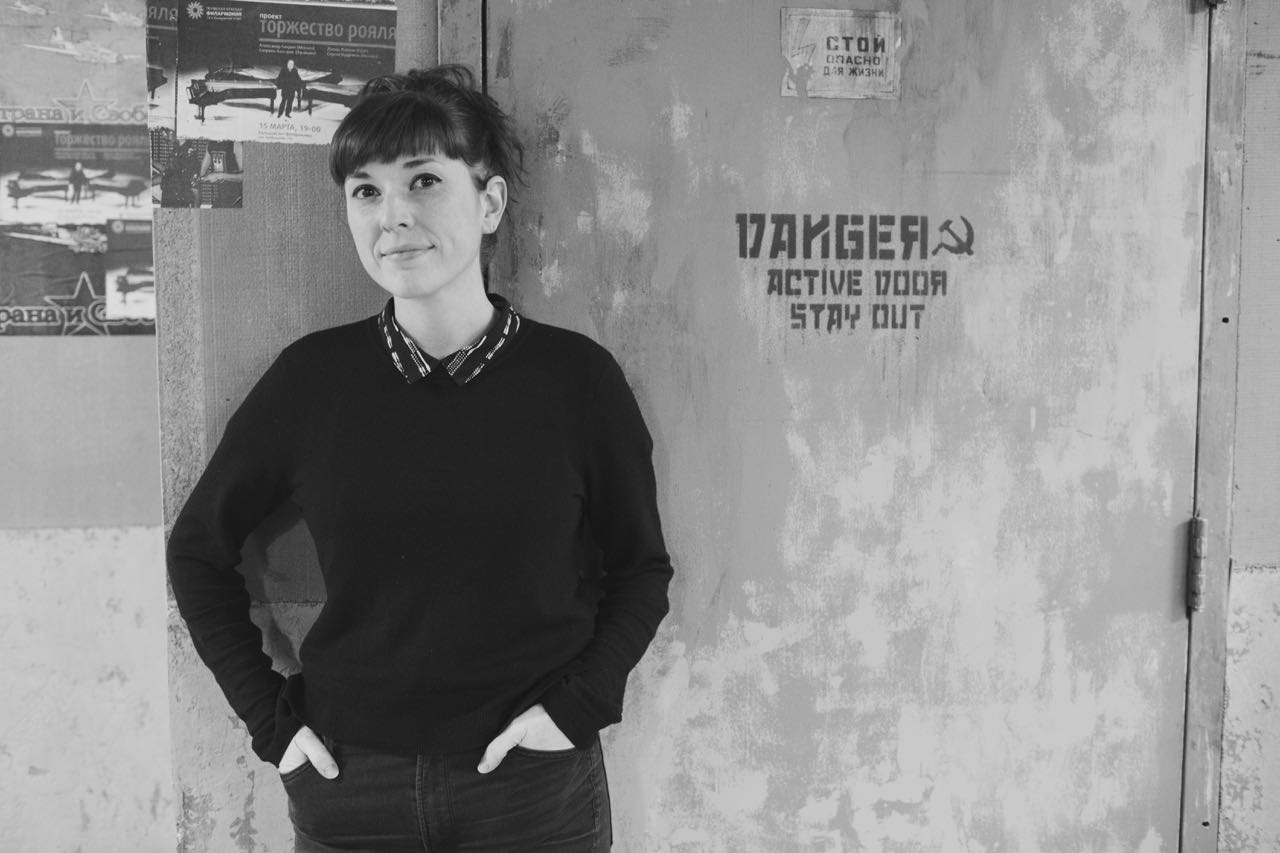
Have you all found that there’s been a learning curve to figuring out how to do the show eight times a week and not go insane? Especially with the show being so popular?
Gelsey: Well, it being popular makes that easier, I think. It feels good to have such appreciative audiences. I get so much energy from the audience, particularly because they’re everywhere and there are moments where you’re playing with them. I’m so thankful that there are these little moments with audience members because it means something is different every show. That wakes you up in a different way. It keeps it really fresh.
Grace: Also, the show is so freaking good. It goes all over the place. It’s a party, it’s funny, it’s beautiful, it’s titillating, it’s devastating. Every time I get to the end of the show, even if at the start of it I’m like, “I don’t know how I’m going to do this today,” by the time I get to the end I’m like, “Oh yeah! What a great job! Look at all this stuff we just went through.” It always feels worth it by the time we get to the end.
Amber: Totally! I always feel like it’s like a Bikram yoga class. That’s why I’m like, “I cannot believe I’m fucking doing this right now.” You start the first breathing exercise and you’re like, “No, no!” Then by the end you’re like, “I feel great!” It’s such an amazing trance state. Every time I’m kicking my legs at you, Grace, I’m like, “How did I make it this far? I’m going to die now. My body’s going break.” Then you don’t.
Gelsey: Just making it through “Balaga.” That is the moment of truth for me.
Have you found that you’ve had to learn to say no to social things outside of the show?
Amber: Absolutely.
Grace: Oh, yeah. All the time. But I have to say that I really like having other things to do outside of this show too. Because it really helps me. I think sometimes it really does help me focus on being in here if I can do some other stuff. I remember coming into this production thinking I really want to be aware of the time that I have outside of it and how I’m using it. Because when we did the show Off-Broadway for a year, it was the fastest year of my life because it is the same thing every day. I was like, “Where did that year go?” I want to be conscious of that and consciously fill the time, outside of taking care of myself, with also having other experiences and seeing other people and still having a rich life.
Brittain: I got a membership to MoMA.
Gelsey: I have one too. There are a number of people in this cast who will relate to this, but my main identity is actually making my own art. And I really love developing work with other people, but it’s so satisfying to go home after doing a show and then work on a song for an hour. Having the time outside of the theatre where I’m working on my own stuff is a really important part of keeping my life feeling balanced.
Brittain: It’s very important to me but I feel like I so seldom do it.
Gelsey: It’s been hard. I’ve definitely had to carve out the time and make it something I’m committed to.
Brittain: I feel like I have to make a decision between, am I going to my friend’s birthday party or am I going to sit at home and drink a glass of wine and work. I find it very difficult to find that balance. I haven’t found it yet, personally.
Amber: I have a 15 month old right now and I am pretty wildly anti-social. I’ll chill in the dressing room sometimes for like 20 or 30 minutes. That’s all I need is those 20 or 30 minutes. Having a kid is the best excuse to be like, “Oh, I’m so sorry. I can’t go out,” when I just straight up don’t want to. I’m blaming my kid who’s long asleep and doesn’t need me anyway. But luckily this cast, especially the ladies, are some of my favorite group of girls I’ve ever been around, so this is sort of my social life. So I’m very happy to come to work and chill and do my thing.

